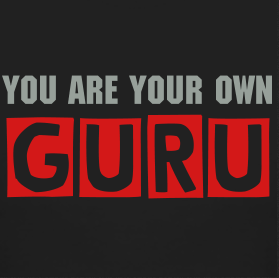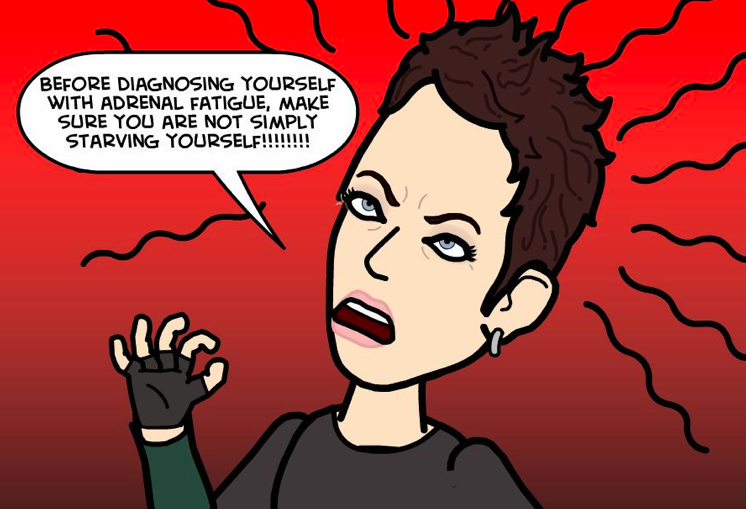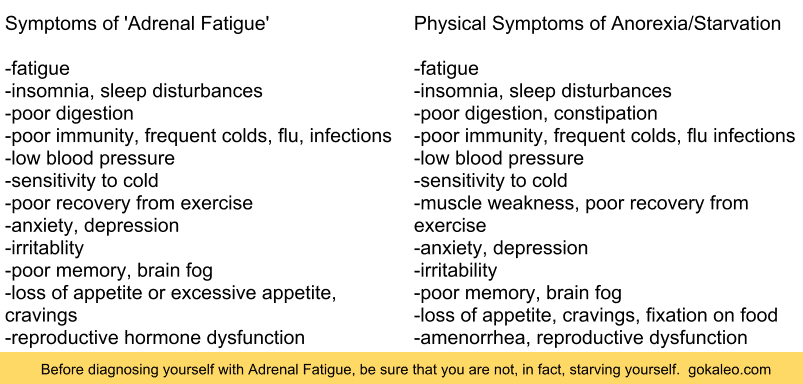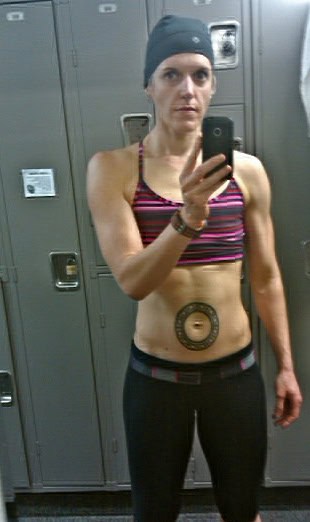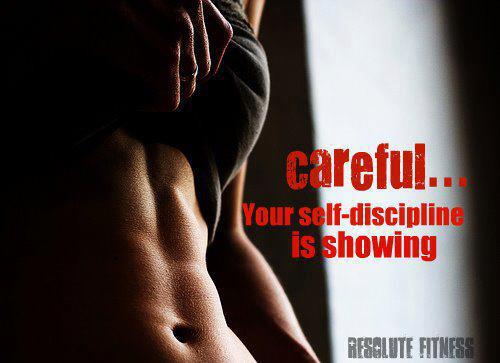I grew up looking at underweight and yet impossibly perfect models on the pages of magazines. It did a number on me. Made me feel ashamed of my fleshy thighs, my broad shoulders, my small breasts. Sparked an unhealthy, decades long troubled relationship with food and my body.
A few years ago, when super-fit, uber lean models started to become popular, I celebrated! Progress, I thought! Perhaps my daughters wouldn’t have to grow up surrounded by such destructive images! Strength a desirable quality? Sign me up!
And as I began my journey towards health, I kept those images close. I replaced the skinny ideal with the super-fit, super-lean ideal as my goal. I began to hear the phrase ‘Strong is the New Skinny’ and was thrilled. I’ve kept a picture of Dara Torres at her leanest on my fridge for four years as inspiration. Crossfit gained in popularity and with it images of strong women accomplishing incredible feats of strength and fitness. How wonderful! Take that, skinny models and the magazines that pushed them on my impressionable daughters!
As I got closer to my goal of a lean, fit body though, something started to change. I began to realize how much time I spend thinking about my diet and my workouts. Don’t get me wrong. In our modern food climate, we need to be diligent and mindful about what we eat, and our lifestyles have become so sedentary and easy that we need to make time to get the exercise that was a built-in component of our ancestors lives. But as I got leaner, I needed to become increasingly disciplined about calories and macronutrients. At some point I realized I’d gone beyond simple mindfulness about food, and had ventured into the sort of behavior that some people might consider an eating disorder. Every calorie, every gram of protein, every micronutrient was being tracked. That’s what I needed to do to continue getting leaner. But oh, did I look great!
Do I want my daughters to grow up healthy and strong? Absolutely. Do I want them to feel pressured to be as disciplined about their diets as I am? Absolutely not.
I think most people can reach a healthy weight and body fat percentage by eating real food, keeping loose track of how much they’re eating and getting adequate exercise most days. I did that! I got down to about 165 pounds and 18-20% body fat fairly easily once I started eating well and exercising. But that wasn’t good enough. After all, I had a picture of Dara Torres at about 9% BF on my fridge. I sure didn’t look like that! Nor did I look like the models I saw in fitness magazines, or the women I saw competing in the crossfit games on TV. I had a lot of work still to do if I wanted to be what had clearly become the standard of beauty and desirability in the fitness world.
Last December, I decided enough was enough. This is ridiculous. That lean ideal is as unrealistic for most of us women as the underweight ideal I grew up with. I was maintaining at about 15% body fat and felt great, looked great, was getting stronger and healthier every day, had a husband who adored my body, and yet when I looked in the mirror I still saw the fleshy thighs. What was it going to take to be what I somehow had absorbed as the new standard of beauty?
I decided to find out, and to blog about it.
I set out with a goal to drop down to the level of leanness we women are barraged with in the popular media. 15% wasn’t it, and I suspected it was going to be single digit body fat for me, given my genetics. I did set some limits out of concern for my health, though:
-I wasn’t willing to sacrifice my basic nutrient needs. If I got to the point that I had to drop my calorie, protein, fat or micronutrient intake below that which is essential for health, I would stop.
-If I started to experience negative health effects of underfat (missing periods, bleeding and bruising, fatigue, hair loss, etc) I’d stop.
How’d I do it? I restricted my calories to just a few hundred less than I burn per day. This was so my body wouldn’t perceive a sudden reduction in calorie intake as famine, and start burning lean mass for fuel in an effort to preserve fat mass. I averaged an intake of 2200-2500 calories a day, I typically burn 2600-3000 calories a day. This kept my metabolism from slowing down. (Important for anyone trying to lose weight! Better to lose it slowly and get to the finish line with a healthy metabolism than to drop weight quickly but kill your metabolism in the process!)
Next, I maximized my protein intake to aid in lean mass preservation. When losing weight, some of the weight you lose will be fat and some will be lean mass. This is true no matter how healthfully you lose the weight. Getting enough protein can help limit lean mass losses though. I was aiming for 150+ grams of protein a day (at a body weight of 160 when I started). It’s difficult to get that much protein from food on 2200 calories a day, even for omnivores. I used a protein supplement to reach that amount.
I did enjoy my food, I didn’t eat anything I hate, so there was that. But I had to be strict with portions, and I had to plan my days carefully to make sure I got everything I needed. And I’m not a fan of protein shakes, so trying to dress them up to make them palatable without adding extra calories was tedious and difficult. There wasn’t any room for creativity, and going out to eat was a nightmare! I’m sure I was no fun in that department. No alcohol, teeny tiny portions of chocolate, no impromptu evenings out because I would need to look at the menu beforehand to plan my meal, and the rest of the day around it!
I kept up with my lifting 3-5 days a week and intended to do more cardio, but in reality that sort of went out the window, mostly because, as I’ll discuss later, I just didn’t have the energy.
I lost 10 pounds over the course of 12 weeks, which is exactly what I would have expected given my 300-500 calories/day deficit. (It IS calories in vs out, people, don’t believe the hype).
My weight loss stalled out at 147 pounds. This is because my weight ‘caught up’ to the number of calories I was consuming. To lose more I would have to reduce my calories or increase my burn through activity. This is where things got really uncomfortable. See, I wasn’t willing to reduce my calories further, because I’d have to sacrifice nutrition. And increasing my activity? Well, by that time I was experiencing unrelenting, low level fatigue, and I simply didn’t have the fuel to do more exercise. I have been bouncing around 148-150 for almost a month now, and it’s one of the reasons I decided to end the experiment when I did. I simply hit a wall that I couldn’t get over without risking my health, and that had been my limit going into this.
I scheduled a hydrostatic body fat test and maintained my weight until the test. That was a few-week wait. During that time I began to see some symptoms of ‘underfat’. There was the fatigue, for starters. And I was constantly impatient and irritable with my family. My husband, bless his heart, really stepped up and ran a lot of interference between my kids and I so they didn’t have to deal with my short temper. I’ve been spacey and forgetful. My libido has completely vanished. Most worrisome, my period didn’t show up when it was supposed to. As I write this, it’s 17 days late. I’ve been like clockwork since I’ve been at a healthy weight.
It’s difficult to find scientific info on the health impact of underfat. Most of it there is is specifically about women who are underweight as well as underfat, and even now at 12% body fat my weight is still a very healthy 150 pounds, making my BMI 22.1, smack dab in the middle of the ‘healthy’ range on the weight charts. I have over 20 pounds worth of ‘cushion’ before I drop into the ‘underweight’ category. Given my declining health, though, it’s clear I can’t spare that weight without risking serious complications.
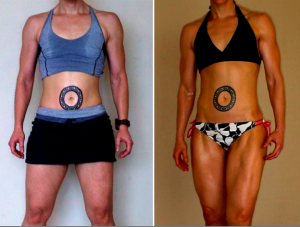
Here is my before and after photo, the difference in color is due to the natural lighting at the time of day the pictures were taken, I’m standing in front of the same wall in both pics. On the left, November 2011 at 160 pounds and roughly 15-16% body fat. On the right 150 pounds and 12% body fat. I look great, don’t I? Aside from some fluff on my knees, I’d look right at home on a fitness magazine cover. And that fluff can be photoshopped out, no problem! But according to the American Council of Sports Medicine, a body fat composition of less than 12 to 14 percent is considered too low and a health risk. Other sources suggest falling below 15 percent is a concern. According to this site, having too little body fat increases the risk of brittle bones, loss of menstrual periods, infertility, dry skin, poor concentration, low mood, feeling cold, constant thoughts about food and low sex drive. Body fat protects the internal organs and aids in proper nerve function. Maintaining too little body fat for any length of time can weaken your bones and contribute to osteoporosis. Too little body fat can effect not just your moods, but your neurological function, triggering full-blown eating disorders in people who’ve previously had a healthy relationship with food.
 I like this picture because while it highlights how lean I am, the look on my face is a great illustration of how I feel. Spacey, out of it, low energy. You’ll also note my complete absence of breast tissue. This is pretty standard when a woman’s body fat gets this low. There are a few lucky women who maintain some semblance of breasts, but most of us, when this lean, will lose the fat in our breasts too. Hence all the surgically enhanced boobs in the fitness industry.
I like this picture because while it highlights how lean I am, the look on my face is a great illustration of how I feel. Spacey, out of it, low energy. You’ll also note my complete absence of breast tissue. This is pretty standard when a woman’s body fat gets this low. There are a few lucky women who maintain some semblance of breasts, but most of us, when this lean, will lose the fat in our breasts too. Hence all the surgically enhanced boobs in the fitness industry.
They don’t tell you this stuff when they bombard you with images of impossibly cut and defined women, do they? They also don’t tell you that the models in those pictures take diuretics (check out the last tip at the end of the article) and restrict water intake, to dehydrate themselves and make their muscles appear more defined. Or that every image you see in the media has been photoshopped and altered to better fit the standard image of beauty. And don’t even get me started on the fake tans, the strategic posing, the surgical enhancements, the flattering lighting, and the drugs some of these women take.
I know I’m going to get lots of comments from people who can maintain an uber-lean physique without experiencing health effects. That’s great! You are very fortunate that your body type has been declared ‘Good and Desirable’ by our culture. There are people who are able to maintain weights and body fat levels that classify them as obese and remain healthy, too. Do we glorify them and suggest that all women should aspire to that ideal? Of course not. Because most of us wouldn’t be healthy if we tried to maintain that physique. Just as most of us wouldn’t be healthy at the body fat levels that are being pushed on us by the media and each other.
I no longer appreciate the ‘Strong is the New Skinny’ meme, mostly because it is generally accompanied by images that are unrealistic and unhealthy for most of us. I believe in the original intention, the celebration of strength. Being strong is great, but you don’t need to be shredded to be strong. And you don’t need to be, or look, strong to be healthy. The original message has been co-opted, twisted and turned into a marketing tool to sell us a new mythology. I’m calling for all of us, even the fitness models and figure competitors, to reject the cultural mythology that there is one standard of beauty and health. Stop buying in! Stop buying the magazines that promote only one ideal, stop sharing and glorifying the pictures on facebook, stop looking at yourself in the mirror and focusing on the ways you don’t look like what you see in the media. Not even the models in those pictures look that way in real life. Health first. If you end up looking ripped because you’ve adopted a healthy lifestyle, great! And if when you are healthy you don’t end up ripped, join the club. It won’t be easy to change the way we think. I admit, I really like the way I look now! There’s a part of me that wants to say ‘screw my health!’ and stay here, or even lose a little more! We are so brainwashed that even when confronted with evidence that what we’re doing is dangerous, we still are tempted to keep doing it because of the positive reinforcement we get from society. I hate it, and want better for my daughters. I want better for myself. I want better for all of you! We all deserve better than this, and to be loved just the way we are.
Did you enjoy this post? Join the discussion on facebook! Click here.




